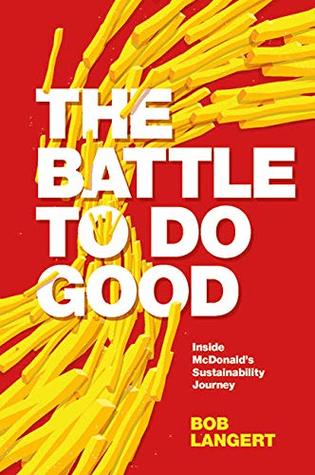When a business proactively defines sustainability, it is good for business, sales, the brand, expense control and even employee satisfaction and recruitment, says sustainability expert and author Bob Langert.

Sustainability is among the largest movements in the last 20 years and on its way to becoming mainstream. For those willing to proactively invest the time and energy, significant opportunity exists, according to Bob Langert, who led McDonald's corporate social responsibility (CSR) and sustainability effort for 27 years and served as the fast-food giant's first vice president of CSR and sustainability.
In his new book, The Battle to Do Good: Inside McDonald's Sustainability Journey, Langert provides behind-the-scenes, real-life stories from his experiences at the Golden Arches. He wrote the book to help companies and organizations better shape their own strategies and connect with activists, advocates, consumers and society in general.
At a time when too many within the food and agriculture sector are sitting on the sidelines or simply playing defense, Langert believes the strategies he outlines will go far in helping others build successful CSR and sustainability standards as well as better manage emerging issues ahead of a crisis.
“It really is so much more about opportunity than about risk,” Langert told Feedstuffs in a recent interview. He explained that when a business proactively defines sustainability, it is good for business, sales, the brand, expense control and even employee satisfaction and recruitment.
Companies and organizations that step up now to define sustainability the way they want it defined and then make it a core part of how they do business are the ones that will benefit most, according to Langert. He noted, though, that it must be treated as a “high-level corporate strategy and not just a side thing kept in a drawer.”
Langert said gone, too, are the days when one could just say they are sustainable. Now, it has be proven. For companies, organizations and even individual producers, that means being on a path of continuous improvement for the betterment of the people, planet, animals and profit as well as measuring and communicating about progress in a fully transparent way, he said.
Langert and the team that developed CSR and sustainability strategy at McDonald's took on such issues as climate change, animal rights, obesity, sourcing practices and deforestation — all highly charged and emotional in their own right. Being in the forefront in the corporate world to openly approach these issues, much learning and adjusting of tactics took place along the way. “Could we have done things differently? Most definitely,” Langert said, pointing out that is one of the reasons for his book — to help others best traverse their own sustainability journey.
A current topic Langert believes needs addressing by the food and agriculture sectors is antibiotic use in food animals. “Honestly, I don't think retail companies, in general, are all that anxious to develop farm and animal policy on their own,” he said, adding that most would prefer having it done in more of a collaborative process that involves stakeholders from all sides and that develops related standards and metrics for measuring progress.
Langert also noted that when it comes to connecting with others on sustainability issues, it is a mistake to think the problem is simply communication; these are not things that can simply be countered by “telling the story.” Langert believes that approach is all wrong.
“First of all, it should never be about 'telling'; it should always be about sharing. Telling is the old-fashioned approach — a one-way communication where I'm going to convince you that my way is right. It really has to be a two-way dialogue done humbly and honestly. That, along with a strategic framework backed up by goals, metrics and transparency, is what gives an organization permission to share its story of sustainability,” he said.
Companies and organizations in the food chain that are not openly sharing their story and playing offense on the important issues are missing out.
“For some reason, people are afraid to make moves. They are afraid for all kinds of reasons: the issues are complicated, they are afraid if they do things they will get criticized, it takes extra effort, and they do have to know more things. The list goes on and on as to why people are afraid to be proactive,” Langert said.
Yet, not being proactive only serves to allow others to define the game, but they may not share your same definition of sustainability. That being so, “they then become the ones that define your brand as well as shape the issues,” Langert said.
“It just baffles me why companies and organizations are still sitting on the fence. The answer is so obvious. It is like having a gold mine in front of you and not putting your hands into it. There is no real downside to defining sustainability beyond a commitment of time and focus,” said Langert, whose book is scheduled for release on Jan. 19.
About the Author(s)
You May Also Like


.png?width=300&auto=webp&quality=80&disable=upscale)
